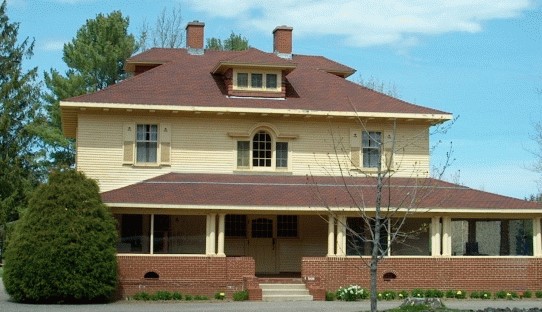
5633 Highway 201: The William Inglis Morse House “Pansy Patch”
5633 Highway 201: The William Inglis Morse House “Pansy Patch”
Architecture Style: Craftsmen
Built: 1917
Dr. William Inglis Morse was a special friend of Paradise. Educated at Paradise, Acadia, and Harvard, he was representative of the many talented people who left Paradise to receive higher education and acclaim, yet turned always toward home.
A descendant of Planter Samuel Morse, he was the youngest son of Joseph and Almira [Phinney] Morse, a bright star in a community that produced many fine minds. An Episcopalian priest in Cambridge, Massachusetts, he loved the arts, especially poetry and the classics. On his travels, he searched the archives of Paris for original Paradise documents and became a highly respected antiquarian and genealogist who produced scholarly and beautiful books on Acadian history. He also wrote histories of Paradise, providing us with much of the local colour we would otherwise have lost.
“W.I.” married Susan Alice Ensign, heiress of the Simsbury Connecticut safety fuse company, Ensign-Bickford Co. In 1917 he and Susan built Pansy Patch, their spacious summer estate. They enlarged their property by buying up pieces of the original Aaron Morse holdings, and on this land created rolling lawns and gardens and even a golf course. Here they invited the literati and well-travelled of Nova Scotia, Massachusetts, and England who were their friends. It was he who employed men during the Depression to build the great stone wall along the Morse property. With a foundation six feet below the surface, it took eight years to build. Their daughter, Susan Hilles, deeded the property to the province in 1963. The woodlot was used for forestry training; Pansy Patch, playground of the wealthy, became “Camp Hilles”, a summer retreat for disadvantaged children and adults. The clock tower built in memory of his parents and siblings: Dr. Vernon, Harry Havelock and Ewart Gladstone, no longer chimes at Pansy Patch, but at the MacDonald Museum, Middleton.
The story goes, as told by Robie Stewart Leonard, his first cousin and friend, that when W.I. attended Harvard with his cousin, he urged Robie to stay in Massachusetts. Why go home to the farm and his love match; why marry the “little school teacher” [Ruby Durling]? The two cousins each loved their home and each did what seemed best; the choices these young men made – to stay or to leave – have been repeated by young people in Nova Scotia for generations, and have affected the destiny of rural Nova Scotia, and Canada itself.
| Owners | |
|---|---|
| Morse, William Inglis | 1917-1952 |
| Morse, Susan Hilles | 1952-1963 |
| Province of Nova Scotia | 1963 |
